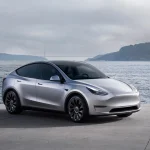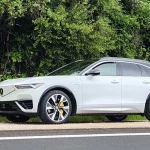
Bio Batteries: Researchers Use Viruses To Improve Electric-Car Energy Storage (Video)Bio Batteries: Researchers Use Viruses To Improve Electric-Car Energy Storage (Video)
Researchers at MIT say that a benign virus could be the next step in improving lithium-air battery technology.
Viruses typically have negative connotations–think seasonal flu or malicious files sent to your computer–but biological technology is an increasingly important research topic and one that could play a large part in our future.
In this instance, reports Transport Evolved, MIT researchers have discovered a way to use a genetically-modified version of the M13 bacteriophage virus to grow manganese oxide nanowires.
Lithium-air batteries use the oxidation of lithium at an anode and reduction of oxygen at a cathode to induce a current flow. The virus-created nanowires act as a catalyst for the cathode in this reaction, where discharge products are deposited as lithium peroxide, and converted back to lithium and oxygen when charging.
One major benefit of the nanowires is their surface area, allowing the battery to transfer more energy–for faster charging, but also greater energy storage.
MORE: Electric car battery breakthroughs: Ultimate guide
The upshot of this is improvements in the two key areas of battery design–recharging and energy density. Lithium-air batteries are already desirable for their light weight and high energy storage capabilities. In turn, this leads to smaller, lighter batteries offering greater range–leading to more usable electric cars.
In fact, lithium-air batteries are so effective that many suggest they have the energy density of gasoline. MIT’s own graphic predicts the average electric car’s range could increase from the 100 miles of today’s vehicles to over 340 miles–similar to many gasoline vehicles.
The use of viruses to grow the nanowires is also a safer option, strange as it sounds. The typical alternative is to build them using plenty of heat and all manner of chemicals–certainly not the greenest of processes.
So next time you have the flu, take consolation from the knowledge that not all viruses are bad–some could help power your future electric vehicle…
_________________________________________
Follow GreenCarReports on Facebook, Twitter and Google+
View original article at : “https://www.greencarreports.com//news/1088487_bio-batteries-researchers-use-viruses-to-improve-electric-car-energy-storage-video”
Add a comment Cancel reply
Comments (0)
ติดตั้งโซลาเซลล์
… [Trackback]
[…] Find More on that Topic: autoseu.com/bio-batteries-researchers-use-viruses-to-improve-electric-car-energy-storage-videobio-batteries-researchers-use-viruses-to-improve-electric-car-energy-storage-video/ […]
Resources
… [Trackback]
[…] Here you can find 51499 more Information on that Topic: autoseu.com/bio-batteries-researchers-use-viruses-to-improve-electric-car-energy-storage-videobio-batteries-researchers-use-viruses-to-improve-electric-car-energy-storage-video/ […]
Where can I buy fresh mushrooms?,
… [Trackback]
[…] Find More on that Topic: autoseu.com/bio-batteries-researchers-use-viruses-to-improve-electric-car-energy-storage-videobio-batteries-researchers-use-viruses-to-improve-electric-car-energy-storage-video/ […]
Categories
- Activism (1)
- Adventure (1)
- Advertising (2)
- Agriculture (1)
- Air pollution (4)
- Air transport (3)
- aluminium (2)
- Amazon (3)
- Animals (1)
- Apple (2)
- Architecture (1)
- Arctic (1)
- Artificial intelligence (1)
- Augmented Reality (1)
- Auto Detailing (1)
- autopilot (1)
- battery (31)
- Best summer holiday destinations 2022 (1)
- Bicycle (1)
- biodiversity (1)
- BMW (2)
- boat (1)
- Bus (1)
- Business (4)
- Buying Guides (1)
- car (7)
- Car industry (18)
- Car News (18)
- car rental (3)
- Car Reviews (4)
- Car sales (6)
- carbon emissions (15)
- carbon footprint (3)
- Carlos Ghosn (1)
- Cars (66)
- Central Europe (1)
- CES (2)
- charging station (11)
- Children (1)
- China (12)
- Citroën (1)
- city (1)
- City transport network (2)
- clean energy (2)
- Climate (1)
- climate change (9)
- Climate crisis (4)
- Climate emergency (2)
- climate protection (2)
- CO2 emissions (39)
- Company (3)
- Competition (1)
- Conscious travel (2)
- Contamination of water (1)
- Copper (2)
- cost of living (2)
- Cuba (1)
- Cuban politics (1)
- Cybertruck (1)
- Cycling (1)
- deforestation (1)
- delivery (3)
- Denmark (2)
- Detroit (1)
- Diesel (4)
- Diesel car (7)
- e-mobility (11)
- e-scooter (2)
- Eco travel (3)
- Eco-friendly (2)
- Ecology (1)
- Economy (1)
- El Niño (1)
- Electric (11,302)
- Electric boats (1)
- electric car (107)
- Electric Cars (499)
- Electricity (5)
- Electricity consumption (3)
- Electricity market (5)
- Elon Musk (21)
- emission (1)
- Emmanuel Macron (1)
- Energy (2)
- Energy low cost (1)
- energy transition (6)
- Entrepreneur (1)
- Environment (5)
- Environment pollution (1)
- Environmental protection (4)
- EU Policy (1)
- EU-China (2)
- Europe (7)
- Europe's energy crisis (1)
- European Commission (3)
- European economy (2)
- European Union (18)
- Euroviews (6)
- Eviction (1)
- EVs (37)
- F1 (1)
- factory (4)
- fake news (1)
- family (2)
- Ferrari (1)
- fertilizer (1)
- fine (penalty) (1)
- fire station service (1)
- flight (1)
- Flying car (4)
- Food security (1)
- Ford (1)
- Formula 1 (2)
- Fossil fuels (14)
- France (39)
- free trade (1)
- Fuel (3)
- Fuel cell electric vehicles FCEV (10)
- fuel crisis (2)
- Fuel Efficiency (3)
- fuel prices (1)
- Funeral (1)
- Gas (1)
- Gas Prices (1)
- gasoline price hike (1)
- German (1)
- Germany (8)
- Giorgia Meloni (1)
- Global warming and climate change (1)
- Good News (1)
- Greece (1)
- green energy (1)
- green new deal (1)
- Green transportation (17)
- Green Week (1)
- greenhouse gas emissions (6)
- Hanoi (19)
- Health (1)
- home (2)
- homelessness (1)
- Housing market (19)
- human rights abuse (1)
- Hybrid (2,283)
- Hybrids (116)
- Hydrogen (2)
- hydrogen vehicle (2)
- IAA Mobility (2)
- Iceland (3)
- incident (1)
- income (1)
- India (2)
- Indonesia (1)
- infrastructure (1)
- innovation (1)
- International relations (1)
- Investment (4)
- iPhone (1)
- Japan (1)
- Jobs (3)
- Joe Biden (4)
- Jubilee (1)
- Lampedusa (1)
- Las Vegas (1)
- lead petrol (2)
- Lithium (13)
- liveable cities (2)
- London (3)
- Luxembourg (1)
- Luxury (2)
- luxury goods (2)
- Luxury lifestyle (2)
- Manufacturing (5)
- Market (1)
- Markets (1)
- meat (1)
- Mercedes-Benz (39)
- Migrants (1)
- minerals (2)
- Mining (5)
- Mitsubishi Motors (1)
- Mobile World Congress (1)
- Mobility (10)
- Mobility Week (2)
- Mobility Week 2021 (1)
- Mobility Week 2023 (5)
- money (3)
- Motorcycling (2)
- Motorsport (1)
- Mountain (1)
- NASA (1)
- nature (2)
- net-zero (2)
- New technologies (6)
- Next Explainers (1)
- Next In data (2)
- Nigeria (1)
- Nissan (3)
- Norway (7)
- Nuclear Energy (1)
- nuclear fusion (1)
- Nuclear power plant (1)
- Odd (1)
- oil industry (1)
- Olaf Scholz (1)
- online shopping (1)
- Oslo (1)
- Paris (1)
- parody (1)
- Petroleum products (3)
- Peugeot (1)
- plastic (1)
- Poland (1)
- Politics (1)
- Pollution (44)
- Power Plant (1)
- prices (1)
- production (1)
- Profits (1)
- Prostitution (1)
- Public transport (4)
- Racing cars (1)
- Racism (1)
- Rail transport (2)
- rats (1)
- Raw material (1)
- Recycling (4)
- Renault (3)
- Renewable energies (6)
- renewable energy (6)
- Reykjavík (1)
- Rishi Sunak (1)
- road (36)
- Road infrastructures (1)
- Road safety (7)
- Road transport (20)
- road trip (1)
- Robot (1)
- Rolls Royce (1)
- Russia (1)
- Russia's invasion of Ukraine (2)
- Sadiq Khan (1)
- safari (1)
- Safety (1)
- Sale (1)
- sales (3)
- Scotland (1)
- self-driving (43)
- Semiconductor (1)
- Shares (1)
- Show (1)
- Silicone (1)
- Software (1)
- Solar energy (2)
- solar power (5)
- Space technology (1)
- Spain (1)
- start-up (3)
- Stock exchange transaction (1)
- Stock market activity (1)
- Stockholm (1)
- Strasbourg (1)
- Students (1)
- Summer Olympics (2)
- Sustainability (7)
- Sustainable city (3)
- Sustainable design (3)
- Sustainable development (1)
- Sustainable innovation (9)
- Sustainable technology (21)
- Sustainable tourism (4)
- Sweden (2)
- Tata Motors (2)
- Tax (37)
- Taxes (2)
- Taxi (1)
- Technology (55)
- Tesla (73)
- The Boring company (1)
- Tokyo Olympic Games 2020 (1)
- Toyota (4)
- trade (3)
- traffic (1)
- Trains (2)
- Transport (11)
- transportation (3)
- Travel destinations (1)
- Tunnel (1)
- Twitter (3)
- UBER (1)
- Ukraine war (1)
- Uncategorized (6)
- United Kingdom (5)
- United States (6)
- urban planning (2)
- Ursula von der Leyen (3)
- US politics (1)
- USA (1)
- vegan (1)
- vehicle (7)
- Video (4)
- Vietnam (19)
- Volkswagen (3)
- Volvo (2)
- waste (1)
- waste disposal (1)
- Water (1)
- Water resources (1)
- White House (1)
- wind energy (1)
- Wind turbine (1)
- Winter (2)
- work conditions (1)
- World Travel Market (1)
- Xiaomi (1)
Recent Posts
About us

Popular Tags
Related posts


Volvo EX30 in the test: Really a premium car at a volume price?

VW ID.7: Estate is not called Variant... It's a Tourer







